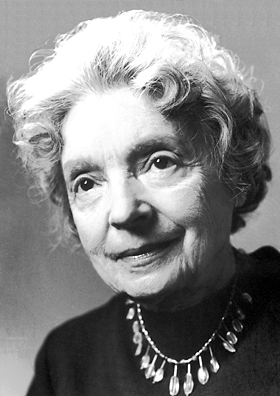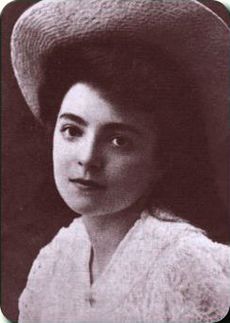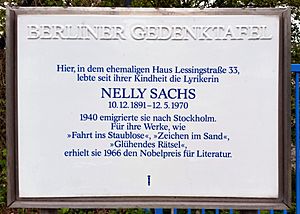Nelly Sachs facts for kids
Quick facts for kids
Nelly Sachs
|
|
|---|---|

Nelly Sachs, 1966
|
|
| Born | Leonie Sachs 10 December 1891 Berlin-Schöneberg, German Empire |
| Died | 12 May 1970 (aged 78) Stockholm, Sweden |
| Occupation | Poet, playwright |
| Nationality | German, Swedish |
| Notable awards | Nobel Prize in Literature (1966) Droste-Preis (1960) |
| Signature | |
Nelly Sachs (10 December 1891 – 12 May 1970) was a German-Swedish poet and playwright. She became a powerful voice for the feelings of her fellow Jews during and after World War II. Her experiences with the rise of the Nazis deeply changed her.
Her most famous play is Eli: Ein Mysterienspiel vom Leiden Israels (1950). She also wrote many poems, including "Zeichen im Sand" (1962) and "Verzauberung" (1970). Her poetry collections include In den Wohnungen des Todes (1947) and Flucht und Verwandlung (1959). Nelly Sachs won the 1966 Nobel Prize in Literature for her important work.
Contents
Early life and escape
Leonie Sachs was born in Berlin-Schöneberg, Germany, in 1891. She came from a wealthy Jewish family. Because she was often sick, she was taught at home. Nelly showed early talent for dance, but her parents did not want her to become a professional dancer.
She grew up as a very shy young woman and never married. She wrote many letters to her friends, including the famous writer Selma Lagerlöf. As the Nazis gained power in Germany, Nelly became very scared. She even lost her ability to speak for a time.
Fleeing to Sweden
In 1940, Nelly Sachs and her elderly mother had to flee Germany. Their lives were saved because of Nelly's friendship with Selma Lagerlöf. Before Lagerlöf died, she asked the Swedish royal family for help. This helped Nelly and her mother get permission to leave Germany.
They escaped on the very last flight from Nazi Germany to Sweden. This happened just one week before Nelly was supposed to be sent to a concentration camp. They settled in Sweden, and Nelly Sachs became a Swedish citizen in 1952.
Life in Sweden and writing
In Stockholm, Nelly and her mother lived in a small two-room apartment. Nelly took care of her mother for many years. She earned money by translating texts between Swedish and German.
After her mother passed away, Nelly Sachs faced difficult times with her mental health. She experienced hallucinations and felt that Nazis were still persecuting her. She spent some years in a mental institution. Even while in the hospital, she continued to write. She eventually recovered enough to live on her own, though her health remained delicate.
Nelly Sachs kept a forgiving attitude towards younger Germans. She wrote letters to many German-speaking writers after the war. These included Hans Magnus Enzensberger and Ingeborg Bachmann.
Friendship with Paul Celan
Nelly Sachs had a very close friendship with another poet, Paul Celan. They called each other "brother" and shared many experiences. Both had lived through the Shoah, which was the terrible persecution of Jews during World War II.
Their friendship was very supportive, especially when they faced challenges in their writing careers. They both found comfort and understanding in each other.
Sachs's unique poetry
Nelly Sachs's poetry is very lyrical, meaning it expresses deep feelings. Her early poems were more influenced by Christian ideas than Jewish ones. They used traditional romantic images and themes.
Later, her writing changed. It became more focused on the suffering of the Jewish people during the Holocaust. Her poems often used the same images over and over, like dust, stars, breath, stones, and blood. These images helped her express deep sorrow and the pain of her people. Her language became very strong and sometimes dreamlike.
Awards and legacy
In 1961, Nelly Sachs won the first Nelly Sachs Prize. This is a literary award given every two years by the German city of Dortmund. The city named the prize in her honor.
Dortmund also asked a composer named Walter Steffens to create an opera based on her play Eli. The opera first opened in 1967.
When Nelly Sachs won the 1966 Nobel Prize in Literature, she shared it with Shmuel Yosef Agnon. She famously said that Agnon represented Israel, while she represented "the tragedy of the Jewish people." At the award ceremony, she read her poem "In der Flucht."
Nelly Sachs passed away in 1970. She was buried in Stockholm, Sweden. Her personal items were given to the National Library of Sweden.
There is a memorial plaque at her birthplace in Berlin. A park in Berlin and another park in Stockholm are also named after her.
See also
 In Spanish: Nelly Sachs para niños
In Spanish: Nelly Sachs para niños
- List of female Nobel laureates
- List of Jewish Nobel laureates
- Manfred George, Nelly Sachs's cousin
 | Jewel Prestage |
 | Ella Baker |
 | Fannie Lou Hamer |



